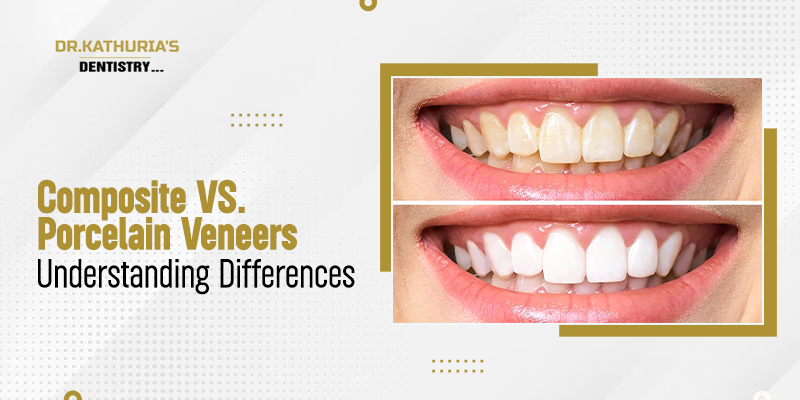Whether your desire lies in obtaining a radiant smile or addressing cosmetic imperfections, veneers frequently present themselves as a superb choice. They are different from dental implants, where your missing teeth are replaced by implants. In contrast, veneers enhance the existing look. Additionally, dental veneers predominantly exist in two variants: porcelain and composite. Choosing the most suitable veneer type hinges upon several diverse considerations. Delve into the dissimilarities below before booking your appointment with the top dental implant surgeon in India for dental veneers.
Difference between Porcelain Veneers and Composite Veneers
The contrast between porcelain veneers and composite veneers lies in their composition and application. Porcelain veneers consist of thin porcelain shells that are bonded to the outer surface of the tooth, while composite veneers are crafted from engineered resin and applied to the tooth’s outer surface. Both types of veneers are designed to blend with your natural teeth, either matching their colour or enhancing their whiteness, resulting in an improved and more appealing smile.
- Time
In terms of application time, composite veneers are the faster option between the two. They can be completed in a single visit. During the appointment with a top dental implant surgeon in India, the resin’s shade will be matched to your surrounding teeth to ensure natural appearance. It is then applied to your teeth, cured, and polished. This means you can leave the dentist’s office on the same day with a brand-new smile!
On the other hand, porcelain veneers typically require at least two visits. On the first visit, your dentist will remove a very thin layer of your teeth. After that they will take an impression of the teeth that will receive the veneers, and send the mould to a dental laboratory. While you wait for your custom veneers to be fabricated, you may wear temporary veneers. During the second visit, your porcelain veneers will be permanently bonded to your teeth using dental cement. Although this process takes more time, the final result can provide a highly aesthetic and long-lasting smile transformation.
- Durability
With adequate care, porcelain veneers are expected to endure for about 10-15 years, whereas composite veneers usually last for 4-8 years. Despite being delicate on their own, porcelain veneers become remarkably robust once bonded to a healthy tooth. They exhibit a high level of durability. On the other hand, composite veneers are also reasonably durable but not as strong as porcelain. They have a higher tendency to chip compared to porcelain. However, if damage were to occur to a porcelain veneer, it would require professional repair or replacement by a dentist, whereas composite veneers can sometimes be easily repaired if the damage is minor.
- Aesthetics
Porcelain veneers have unmatched aesthetics due to their translucent properties and resistance to stains. They can eliminate the need to whiten natural teeth if applied to the upper and lower teeth. However, they are not reversible. In contrast, composite veneers can be reversed if needed, but they may stain like natural teeth.
Experience excellence in dental care at Dr. Kathuria’s Dentistry!
Our skilled team is committed to providing top-notch services, from dental implants in South Delhi to smile makeovers. With cutting-edge technology and a patient-centred approach, your oral health is in trusted hands. Schedule your appointment today and discover your perfect smile.
 Australia No
Australia No Canada No
Canada No India Toll Free No
India Toll Free No UK No
UK No USA No
USA No












